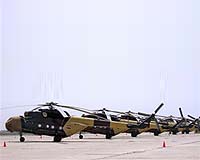| . |  |
. |
Washington (UPI) Jun 11, 2009 How is the U.S. national interest in Iraq to be defined? It is obviously in the American national interest to end its involvement in a long-running, extremely expensive and exhausting counterinsurgency war that has now lasted longer than more than six years. That is two and a half years longer than the total U.S. involvement in World War II. The U.S. Army and Marines combat forces have been exhausted by their long and repeated deployments in Iraq, and now they are being much more deeply committed to Afghanistan by President Barack Obama. The early facile optimism of President George W. Bush, his Vice President Dick Cheney and their Defense Secretary Donald Rumsfeld that the war would quickly "pay for itself' as the first Gulf War against Iraq in 1991 did was soon dashed by unexpected developments -- the rise of the Sunni Muslim insurgency in Central Iraq and the remarkable incompetence of the Bush administration -- especially the civilian planners in Rumsfeld's Department of Defense -- in failing to secure peace and security in Iraq after their forces occupied Baghdad in April 2003. However, a lot depends on how the national interest is defined. If the national interest is identified in stopping, or at least drastically curtailing, as soon as possible the hemorrhaging of U.S. blood and treasure, then a simple, uncomplicated withdrawal of all U.S. forces and personnel from Iraq, military and civilian alike, as soon as possible should obviously be the top priority. But there is a question that all the reasonable critics who say, essentially, that "enough is enough" do not wish to confront. Namely: "Are there any serious strategic consequences, not for Iraq, but for the United States of America in abandoning the Iraqis to their own destiny?" For if the U.S. armed forces leave and Iraq collapses, can there be adverse short-term or long-term consequences that will be so dire for the American people and the U.S. national self-interest that, by comparison, supporting now, at a high price, the wobbling Maliki government for the indefinite future well beyond the withdrawal date of the end of 2010 would appear quite appealing? The Bush administration was vocal in pointing out the possible implications of a too precipitous U.S. military withdrawal from Iraq. These include collapse of any residual law and order; full-scale civil war; the probable foreign intervention of Iran to help the Shiites, and of Arab countries to support the Sunnis; Turkey to thwart any attempt to create a Kurdistan that may claim territories under its sovereignty; the establishment of al-Qaida sanctuaries and training camps; and ensuing chaos in a volatile region of continuing strategic significance for the United States and the whole world in light of its oil production and reserves. Part 7: What Bush and his policymakers got right about Iraq (Paolo Liebl von Schirach is the editor of SchirachReport.com, a regular contributor to Swiss radio and an international economic-development expert.) (United Press International's "Outside View" commentaries are written by outside contributors who specialize in a variety of important issues. The views expressed do not necessarily reflect those of United Press International. In the interests of creating an open forum, original submissions are invited.) Share This Article With Planet Earth
Related Links Iraq: The first technology war of the 21st century
 Analysis: U.S. pulls back troops in Iraq
Analysis: U.S. pulls back troops in IraqBaghdad (UPI) Jun 11, 2009 U.S. forces are steadily closing or transitioning bases around the country and repositioning manpower to meet a pullback deadline set by the new Strategic Framework Agreement governing continued American presence in the country. In mainly rural Diyala province, north of Baghdad, only about five of 14 facilities in use at the beginning of the year will remain under U.S. authority come ... read more |
|
| The content herein, unless otherwise known to be public domain, are Copyright 1995-2009 - SpaceDaily. AFP and UPI Wire Stories are copyright Agence France-Presse and United Press International. ESA Portal Reports are copyright European Space Agency. All NASA sourced material is public domain. Additional copyrights may apply in whole or part to other bona fide parties. Advertising does not imply endorsement,agreement or approval of any opinions, statements or information provided by SpaceDaily on any Web page published or hosted by SpaceDaily. Privacy Statement |